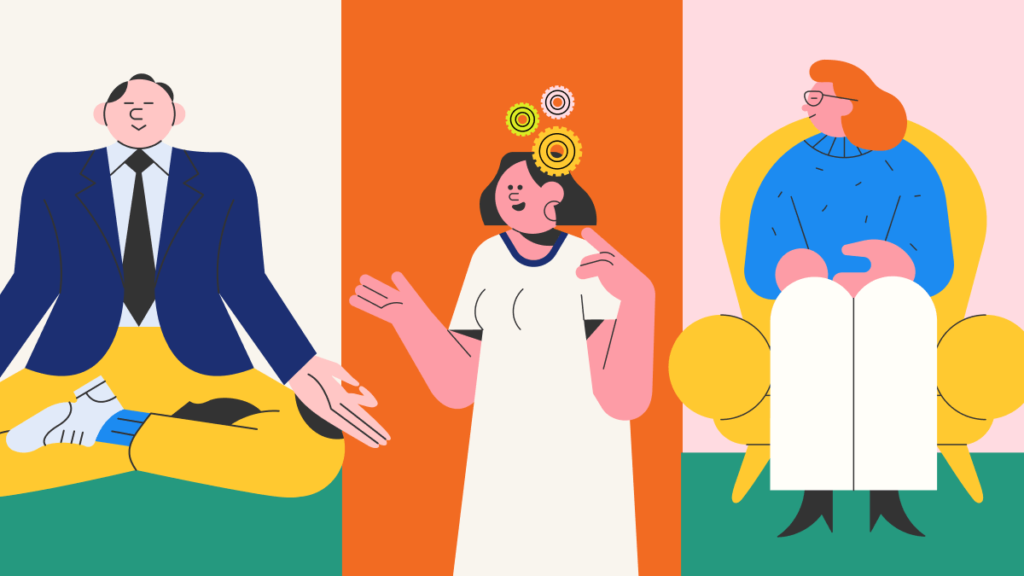Imagine waking up one day and no longer being able to trust your own thoughts, or feeling as if the world around you has shifted in ways no one else seems to notice. For people living with Schizophrenia, this can be a daily reality.
The word “schizophrenia” is often misrepresented in the media, but it’s one of the most complex mental health conditions. More than a fleeting change in mood or unpredictable behaviours, Schizophrenia is a mental health condition that affects how a person thinks, feels and relates to the world.
If you or someone you care about has been struggling with uncommon thoughts, experiencing sights, sounds, or sensations that others don’t notice, feeling disconnected from reality, or displaying confusing behaviour, this guide is here to help you understand what Schizophrenia truly is and how to get the support you need.
What is Schizophrenia?
Schizophrenia is a complex mental health condition that can deeply affect how a person perceives the world and connects with others. Rather than being defined by one specific symptom, it often involves a combination of experiences such as hearing voices, seeing things that aren’t actually there in the environment, holding atypical beliefs, struggling to organise thoughts, speaking incoherently, or feeling emotionally numb.
These experiences can look different from one person to another and may come and go over time. Importantly, what is considered concerning depends heavily on a person’s social, cultural, and religious context. In some cultures, hearing God’s voice or believing you are a messenger of God may be an accepted part of religious life. In certain contexts, such as during religious ceremonies or shortly after a recent death, brief hallucinations (e.g. seeing the deceased) may also be expected.
What often stands out, though, is a gradual decline in day-to-day functioning. Someone living with Schizophrenia might begin to struggle with work or school, grow distant in relationships, or have difficulty caring for themselves.
These changes can be distressing not only for the person affected but also for their loved ones, especially when there’s a noticeable shift from how things used to be.
What causes Schizophrenia?
There is no single cause of Schizophrenia; it arises from a combination of genetic, biological and environmental factors that influence brain development and function. While the exact triggers are still being studied, research has identified several key contributors:
- Genetic: Having a relative with Schizophrenia and/or certain genetic variations—also linked to bipolar disorder, depression, and autism spectrum disorder—increases risk.
- Neurobiological: Differences in brain structure and disruptions in dopamine, a brain chemical linked to motivation and attention, contribute to vulnerability.
- Neuropsychological: Hallucinations are now widely understood as misinterpretations of internally generated sensations—such as inner speech or imagery—that the brain mistakenly perceives as originating externally. Influenced by a complex interplay between brain processes and psychological factors, these experiences disrupt self-monitoring and perception.
- Physiological: On top of pregnancy and birth complications, some studies suggest a slightly higher incidence among individuals born in late winter or early spring.
- Environmental: Growing up in an urban environment or being part of a minority ethnic group has been linked to increased risk, possibly due to stress, adversity and/or genetic vulnerability—all of which influences brain development.
Can Schizophrenia be cured?
The DSM-5 (Diagnostic Statistical Manual, Fifth Edition), a handbook professionals use to diagnose mental health conditions, describes Schizophrenia as a long-term condition that can be managed with long-term support. While psychotic symptoms may ease with age, cognitive symptoms and the decline in functioning often persist. Even though many continue to experience varying levels of symptoms and functional challenges, treatment and strong family support can enhance coping and reduce impact, and in turn bring stability and improve quality of life.
Symptoms of Schizophrenia
To be diagnosed with Schizophrenia, a person must experience at least two of the following symptoms for a significant portion of time over one month, with at least one being delusions, hallucinations, or disorganised speech:
- Delusions: Firmly held beliefs such as thinking you’re being watched, followed, or controlled, despite evidence to the contrary.
- Hallucinations: Sensing things that aren’t there, such as hearing voices, or seeing things others don’t.
- Disorganised speech: Speaking in a way that’s difficult to follow. Sentences may jump from one idea to another or become incoherent.
- Grossly disorganised or catatonic behaviour: Unpredictable movements or actions, such as sudden agitation, unusual postures, or a lack of response to one’s environment.
- Negative symptoms: These include reduced emotional expression and a lack of motivation to engage in everyday activities like working, socialising, or self-care.
These symptoms should not be better explained by substance use, medical (e.g., auditory, visual, somatic, neurological, neurocognitive conditions) and mental health conditions.
Such beliefs (delusions) and experiences (hallucinations) may not be uncommon, but one will do well to seek help when they:
- Significantly deviate from the individuals’ social, cultural, and religious context
- Impact the individuals’ daily life and relationships (e.g. disregarding laws and putting themselves and others in danger)
Over time, everyday life may get more challenging. It might become harder to keep up with school or a job, stay connected with friends and family, or handle daily tasks like getting dressed or doing chores.
When Schizophrenia starts early in life—typically during teenhood or or early adulthood—it can also impede learning, building relationships, or growing emotionally in the way others might at that age.
How Schizophrenia is diagnosed
The idea of getting a diagnosis can feel overwhelming at first, but it’s also a powerful step toward making sense of what you’re going through.
During the diagnostic process, your clinician will speak with you on how your symptoms are affecting your thoughts, emotions, and daily life. With your permission, they may also interview family or caregivers who can offer additional insights. This step is crucial for your clinician to contextualise your experiences within your social, cultural and religious background.
When assessing Schizophrenia, clinicians follow guidelines from the DSM-5. They may also use diagnostic tools and rating scales like the ones below:
Schizophrenia tests
- Positive and Negative Syndrome Scale (PANSS)
- Brief Psychiatric Rating Scale (BPRS)
- Scale for the Assessment of Positive Symptoms (SAPS) and Scale for the Assessment of Negative Symptoms (SANS)
- Psychotic Symptom Rating Scales (PSYRATS)
- Calgary Depression Scale for Schizophrenia (CDSS)
- Clinical Global Impression-Schizophrenia (CGI-SCH)
Your clinician may also screen you for other mental health conditions, such as mood or developmental disorders, that might better explain what you’re going through. Likewise, they may conduct or refer you for medical evaluations to rule out other causes of your symptoms, such as substance use or underlying health conditions.
How Schizophrenia is treated
The most effective Schizophrenia treatments combine medication with psychotherapy and other psychosocial support, tailored to each person’s unique needs, stage of illness, and goals.
Schizophrenia medication
There are two main types of medications that can help people living with Schizophrenia: first-generation and second-generation antipsychotics.
First-generation antipsychotics help ease symptoms like hallucinations or delusions, and they can lower the chance of another episode. Second-generation antipsychotics treat those same symptoms, but they also support people who feel emotionally distant, unmotivated, or disconnected. These medications are often used long-term, during active episodes and for ongoing support, to help prevent relapses and enable a more stable recovery.
It may take time to find the medication that works best for you, but it’s an important part of feeling more like yourself again.
(While Intellect Clinic does not prescribe medication, we can refer you to a psychiatrist within our network where necessary.)
Psychotherapy
Cognitive Behaviour Therapy (CBT) for Schizophrenia has proven to improve coping and reduce symptoms of Schizophrenia.
It focuses on helping a person with Schizophrenia talk through their experience, develop an understanding of their symptoms, and explore healthier ways of thinking and responding to distressing symptoms in order to improve functioning. One specific technique is belief modification, where a therapist helps their client examine troubling beliefs, test them through small, safe “experiments” together, and consider alternative perspectives.
For example, if a client is convinced they are being watched through the television and that others are coming to harm them, the therapist might work with them to test that belief in a non-confrontational way suited to the client’s readiness.
They may agree to leave the television switched on for a few minutes and observe whether the predicted harmful outcomes occur. Through a series of such “experiments,” the therapist supports the client in re-evaluating their beliefs and working toward updating them.
Psychosocial support
Several types of psychosocial support have been shown to help people living with Schizophrenia spectrum disorders (SSD). These include:
- Family interventions – help families better understand the condition and cope more effectively.
- Social skills training – helps individuals improve communication and build stronger relationships.
- Supported employment – increases the chances of getting and keeping a job.
Managing Schizophrenia at Intellect Clinic
If you or someone you care about is experiencing symptoms that might be related to Schizophrenia, know that help is available. Early intervention can make a meaningful difference in understanding your condition and reclaiming control over it.
At Intellect Clinic, our team provides evidence-based care tailored to each client’s needs. 50-minute sessions with our counsellors and clinical psychologists are priced at $160 and $240 (Singapore dollars) respectively, and we offer appointments at our clinics in:
- Marina One
- Dhoby Gaut
- Tanjong Pagar
- Woodleigh
- Tembeling






